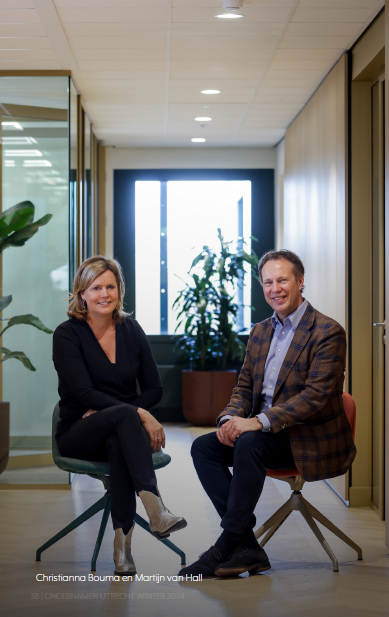....Relatiebeding - goed formuleren loont!..Non-solicitation clause - proper formulation pays off!....
....Relatiebeding - goed formuleren loont!..Non-solicitation clause - proper formulation pays off!....
….In een relatiebeding wordt opgenomen dat een werknemer na zijn vertrek gedurende een bepaalde tijd niet voor relaties van werkgever mag werken.
Hoe dit precies geformuleerd wordt is van groot belang, en gaat in de praktijk nog wel eens mis. Dit gebeurde bijvoorbeeld bij High Focus B.V.
..A non-solicitation clause stipulates that an employee may not work for clients of the employer for a specified period after his or her departure. The precise wording is of great importance and problems often arise in practice. This happened, for example, in the case of High Focus B.V. ….
Archief..Archive
- July 2025
- January 2025
- July 2024
- December 2023
- March 2023
- December 2022
- October 2022
- May 2022
- December 2021
- November 2021
- September 2021
- June 2021
- April 2021
- March 2021
- January 2021
- December 2020
- October 2020
- July 2020
- April 2020
- March 2020
- January 2020
- December 2019
- November 2019
- October 2019
- June 2019
- February 2017
- June 2016
….Wat stond er in het relatiebeding?..What did the non-solicitation clause say?….
….In de arbeidsovereenkomst tussen een werknemer, laten we hem Jan noemen, en High Focus was -kort samengevat- opgenomen dat het Jan een jaar na het einde van de arbeidsovereenkomst met High Focus niet was toegestaan een arbeidsovereenkomst aan te gaan met ondernemingen waaraan High Focus ten tijde van het actieve dienstverband een klantrelatie onderhoudt.
De kritische lezer valt al op dat waar ‘waaraan’ staat, ‘waarmee’ had moeten staan.
..Briefly summarised, the employment contract between an employee (let’s call him John) and High Focus provided that John was not permitted to conclude an employment contract with companies to which High Focus maintained a customer relationship at the time of the active employment for a year after the termination of John’s employment contract with High Focus. The critical reader will notice that ‘to which’ should have been ‘with which’. ….
….Wat is er gebeurd?..What happened?….
….Jan heeft deze arbeidsovereenkomst ondertekend op 1 augustus 2012. Tijdens zijn dienstverband heeft hij gewerkt voor de gemeente Bergen op Zoom, eerst vanuit High Focus. Met ingang van 1 januari 2014 wordt de (later opgerichte) dochtervennootschap RS4U daartussen gezet. De gemeente Bergen op Zoom sluit een overeenkomst met RS4U maar Jan verricht nog steeds dezelfde werkzaamheden bij de gemeente en is nog steeds in dienst van High Focus.
Jan zegt zijn arbeidsovereenkomst op met ingang van 1 oktober 2014. De gemeente zegt haar overeenkomst met RS4U op, ook per 1 oktober 2014.
Met ingang van 1 oktober 2014 verricht Jan via ICT-BERM werkzaamheden voor de gemeente Bergen op Zoom. High Focus vindt dat dit niet kan en wijst Jan op het relatiebeding.
..John signed this employment contract on 1 August 2012. During his employment, he worked for the municipality of Bergen op Zoom, initially on behalf of High Focus. With effect from 1 January 2014, the (later established) subsidiary RS4U was placed between them. The municipality of Bergen op Zoom concluded a contract with RS4U, but John still performed the same work for the municipality and was still employed by High Focus. John terminated his employment contract with High Focus with effect from 1 October 2014. The municipality terminated its contract with RS4U, also with effect from 1 October 2014. As of 1 October 2014, John then worked for the municipality of Bergen op Zoom via another company, ICT-BERM. High Focus did not accept this and drew John’s attention to the non-solicitation clause. ….
….Wat vindt de rechter?..What did the court think?….
….Er volgt een procedure, eerst bij de kantonrechter, daarna in hoger beroep bij het Hof Den Bosch. High Focus trekt aan het kortste eind. Zij heeft het relatiebeding per 1 januari 2014 niet gewijzigd, door bijvoorbeeld op te nemen dat voormalige relaties van High Focus ook onder het relatiebeding bleven vallen. Jan had niet hoeven begrijpen of verwachten dat hij ook niet voor relaties van RS4U had mogen werken.
Jan mag dus blijven werken voor de gemeente Bergen op Zoom.
De uitspraak van het Hof Den Bosch van 26 november 2019 kun je hier lezen.
..Proceedings followed, first at the subdistrict court, and then on appeal at Den Bosch Court of Appeal. The decision went against High Focus. It had not amended the non-solicitation clause with effect from 1 January 2014, for example by stipulating that former clients of High Focus would also continue to fall within its scope. John was not required to understand or expect that he could not work for clients of RS4U either. He was therefore permitted to continue to work for the municipality of Bergen op Zoom. You can read Den Bosch Court of Appeal’s judgement of 26 November 2019 (in Dutch) here. ….
….Hoe had dit beter gekund?..How could this have been done better?….
….High Focus had beter op kunnen nemen dat Jan niet mocht werken voor klanten van High Focus en/of voor klanten van aan High Focus gelieerde ondernemingen.
High Focus had ook kunnen opnemen dat Jan niet mocht werken voor relaties met wie werkgever gedurende 12 (of 18) maanden voor het eindigen van de arbeidsovereenkomst zakelijke contacten heeft onderhouden, daaronder ook potentiële relaties begrepen.
Bovendien had High Focus beter kunnen opnemen dat Jan niet (direct of indirect, betaald of onbetaald) mocht werken voor relaties van High Focus. Nu stond er immers dat Jan met die klanten geen arbeidsovereenkomst mocht aangaan. Dat valt al snel te omzeilen, bijvoorbeeld door als zelfstandige te gaan werken.
..It would have been wiser for High Focus to stipulate that John was not permitted to work for clients of High Focus and/or for clients of companies affiliated with High Focus. High Focus could also have stipulated that John was not permitted to work for clients – including potential clients – with whom the employer maintained business relations 12 (or 18) months prior to the termination of the employment contract. Moreover, it would have been better for High Focus to have stipulated that John was not permitted to work for clients of High Focus (directly or indirectly, paid or unpaid); the clause said only that he was not permitted to conclude an employment contract with those clients. Such a provision can easily be circumvented, for example by starting to work as a self-employed person. ….
….Advies..Our advice….
….Denk goed na over het verwoorden van een relatiebeding (en andere bedingen). Wij kunnen ons voorstellen dat u zich wilt richten op uw relaties zelf en niet op de punten en komma’s in de arbeidsovereenkomst. Aan de andere kant wilt u natuurlijk niet dat werknemers zomaar aan de slag kunnen bij de concurrent of een relatie, met bij de bij u opgedane kennis. De werknemer beschikt misschien ook wel over allerlei gevoelige informatie van het bedrijf! Vraag ons daarom het relatiebeding op te stellen of het beding te toetsen. Dat geldt ook voor het concurrentiebeding, geheimhoudingsbeding, een anti-ronselbeding en bijbehorend boetebeding. Wij ontzorgen u graag!
..Think carefully about the wording of a non-solicitation clause (and any other clauses). We can imagine that you are more concerned about your clients themselves, rather than about the detailed wording of an employment contract. On the other hand, you certainly do not want an employee to simply be able to start working for a competitor or a client, possibly using knowledge acquired from you. The employee may also have all kinds of sensitive information about your company. Therefore, we recommend that you ask us to draw up or check any non-solicitation clauses. The same applies to non-competition clauses, confidentiality clauses, non-recruitment clauses and the corresponding penalty clauses. We would be happy to take care of this work for you. ….
….Meer weten?..Want to know more?..
....Op 30 januari 2020 organiseren we een kennissessie, die geheel in het teken staat van ‘bijzondere bedingen’. Een interactieve middag met een klein groepje deelnemers. Als u hierin geïnteresseerd bent, stuur dan een e-mail aan office@vanhallarbeidsrecht.nl. U ontvangt daarna de uitnodiging met daarin de precieze tijden, de onderwerpen en opgave van de (beperkte) kosten.
..On 30 January 2020, we will be organising a knowledge session, which will be entirely dedicated to ‘special clauses’. It will be an interactive afternoon with a small group of participants. If you are interested in taking part, please send an email to office@vanhallarbeidsrecht.nl. You will then receive the invitation including the precise times, the subjects to be covered and details of the (limited) costs involved. ….























